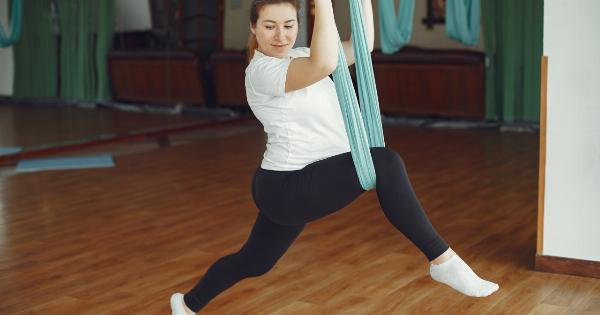Staying active during pregnancy is crucial for both the health of the expecting mother and the development of the baby.
Although it is important to be cautious and consult with a healthcare provider before starting or continuing any exercise routine while pregnant, there are many benefits to exercising during this special time. In this article, we will delve into the essentials of exercising while pregnant, outlining the key considerations, safety guidelines, and recommended exercises for expectant mothers.
1. Benefits of Exercising During Pregnancy
Regular exercise during pregnancy offers a wide range of benefits for both the mother and baby. Some of these benefits include:.
- Improved cardiovascular health
- Increased muscle strength and endurance
- Reduced pregnancy discomfort
- Improved mood and mental well-being
- Enhanced stamina for labor and delivery
- Promoted healthy weight gain
- Reduced risk of gestational diabetes and preeclampsia
- Quicker postpartum recovery
However, it is important to note that every pregnancy is unique, and it is crucial to consult with a healthcare provider before initiating or continuing any exercise routine.
2. Safety Guidelines for Exercising While Pregnant
While exercise is encouraged during pregnancy, certain precautions and safety guidelines need to be followed to protect the well-being of both the mother and baby. Here are some important safety tips:.
- Consult with your healthcare provider: Before starting or continuing any exercise routine during pregnancy, it is essential to consult with your healthcare provider to ensure it is safe for you and your baby.
- Choose low-impact exercises: Opt for low-impact exercises that minimize stress on the joints and reduce the risk of falls or injuries. Examples include walking, swimming, stationary cycling, and prenatal yoga.
- Stay hydrated: Drink plenty of water before, during, and after exercise to stay hydrated.
- Wear comfortable clothing and footwear: Dress in loose-fitting, breathable clothing and supportive footwear to stay comfortable and reduce the risk of injury.
- Avoid overheating: Avoid exercising in hot and humid conditions, as overheating can be harmful to both the mother and baby. Choose air-conditioned or well-ventilated environments instead.
- Listen to your body: Pay attention to how your body feels during exercise. If you feel any pain, dizziness, or shortness of breath, stop exercising and consult with your healthcare provider.
- Modify exercises as needed: As pregnancy progresses, certain exercises may need to be modified or avoided altogether. Adapt exercises to accommodate your changing body and seek guidance from a qualified prenatal fitness instructor, if needed.
- Avoid lying flat on your back: After the first trimester, avoid exercises or positions that require lying flat on your back, as this can put pressure on the vena cava and reduce blood flow to the baby.
- Warm-up and cool-down: Always begin your exercise routine with a gentle warm-up and end with a cool-down to prevent injury and allow your body to gradually adjust.
- Listen to your body: Most importantly, listen to your body throughout your pregnancy journey. If you feel tired or need to rest, take a break.
3. Recommended Exercises for Pregnant Women
Here are some safe and effective exercises that are generally recommended for pregnant women:.
3.1 Walking:
Walking is a low-impact aerobic exercise that can be easily incorporated into a daily routine. It helps improve cardiovascular fitness, strengthens leg muscles, and promotes healthy weight gain during pregnancy.
It is a safe exercise for all stages of pregnancy.
3.2 Swimming:
Swimming and water aerobics are gentle on the joints and provide resistance without putting pressure on the abdomen. These exercises help alleviate swelling, improve circulation, and reduce the risk of overheating.
3.3 Prenatal Yoga:
Prenatal yoga focuses on gentle stretching, relaxation, and breathing techniques. It helps improve flexibility, balance, and posture while promoting stress reduction and mental well-being.
Look for specialized prenatal yoga classes or follow online tutorials tailored for pregnant women.
3.4 Stationary Cycling:
Using a stationary bike is a safe and low-impact way to improve cardiovascular fitness and strengthen leg muscles during pregnancy. It helps maintain joint mobility while reducing stress on the joints.
3.5 Modified Strength Training:
Strength training with lighter weights and modified exercises can help maintain muscle tone and strength during pregnancy. Focus on exercises that target major muscle groups such as squats, lunges, and modified push-ups.
Always use proper form and avoid lifting heavy weights or straining excessively.
3.6 Prenatal Pilates:
Prenatal Pilates focuses on core strength, stability, and flexibility. It helps improve posture, reduce back pain, and strengthen the pelvic floor muscles.
Look for prenatal Pilates classes taught by certified instructors who are knowledgeable about pregnancy modifications.
3.7 Pelvic Floor Exercises:
Strengthening the pelvic floor muscles is vital during pregnancy and can help prevent urinary incontinence and support the additional weight of the growing uterus.
Kegel exercises, which involve contracting and relaxing the pelvic floor muscles, can be done anywhere and at any time.
3.8 Prenatal Dance Classes:
Dancing not only provides an enjoyable way to stay active but also helps improve cardiovascular fitness, muscle tone, and coordination. Look for prenatal dance classes specifically designed for pregnant women.
3.9 Low-impact Aerobics:
Low-impact aerobics classes cater to the needs of pregnant women, offering a safe and effective way to maintain cardiovascular fitness and overall strength.
These classes often include a combination of aerobic movements, strength exercises, and stretching.
3.10 Stretching and Relaxation Exercises:
Stretching exercises help improve flexibility, reduce muscle tension, and alleviate discomfort during pregnancy. Gentle stretching of major muscle groups can be done daily, along with relaxation exercises such as deep breathing and mindfulness.
Conclusion
Exercising during pregnancy offers numerous benefits, including improved cardiovascular health, reduced pregnancy discomfort, and enhanced stamina for labor and delivery.
However, it is essential to prioritize the safety and well-being of both the mother and baby, following the recommended guidelines and consulting with a healthcare provider. By choosing appropriate exercises and listening to their bodies, expectant mothers can maintain a healthy and active lifestyle throughout their pregnancy journey.
























